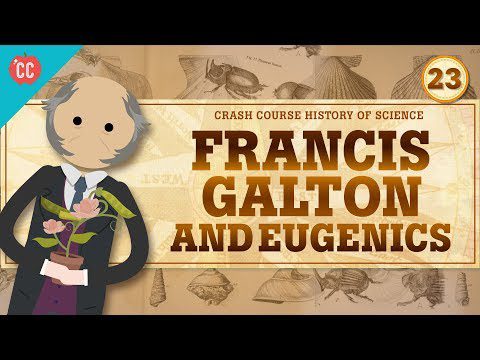După ce Darwin a aruncat în aer comunitatea științifică, mulți oameni au făcut lucruri ciudate și neștiințifice cu ideile sale. Francis Galton și alți câțiva au decis că selecția naturală ar putea fi folosită pentru a face rasa umană „mai bună” și au venit cu eugenismul.
***
Crash Course este pe Patreon! Ne puteți susține direct înregistrându-vă la http://www.patreon.com/crashcourse
Mulțumim următorilor Patroni pentru contribuțiile lor lunare generoase care ajută la menținerea Crash Course gratuită pentru toată lumea pentru totdeauna:
Mark Brouwer, Kenneth F Penttinen, Trevin Beattie, Satya Ridhima Parvathaneni, Erika & Alexa Saur, Glenn Elliott, Justin Zingsheim, Jessica Wode, Eric Prestemon, Kathrin Benoit, Tom Trval, Jason Saslow, Nathan Taylor, Brian Thomas Gossett, Khaled El Shalakany , Indika Siriwardena, SR Foxley, Sam Ferguson, Yasenia Cruz, Eric Koslow, Caleb Weeks, DA Noe, Shawn Arnold, Malcolm Callis, Advait Shinde, William McGraw, Andrei Krishkevich, Rachel Bright, Mayumi Maeda, Kathy & Tim Philip, Jirat, Ian Dundore
—
Doriți să găsiți Crash Course în altă parte pe internet?
Facebook – http://www.facebook.com/YouTubeCrashCourse
Twitter – http://www.twitter.com/TheCrashCourse
Tumblr – http://thecrashcourse.tumblr.com
Curs intensiv de asistență pe Patreon: http://patreon.com/crashcourse
CC Copii: http://www.youtube.com/crashcoursekids


In regards to a common question in the comments: "Why was Eugenics bad/bad science, a terrible idea, etc…" Here are responses from our writer and consultant. Thanks for being curious, y'all! 🙂
Response 1:
Super short version, there were a number of serious problems from the jump.
For one, eugenics assumed that people are like plants or nonhuman animals: driven primarily by instinct, capable of only so much change in a lifetime—basically, products of “nature,” not “nurture,” as we say in the episode. In fact, the opposite appears to be true about most traits. Most traits also appear to be multifactorial, meaning that, alas, there is not one gene for awesomeness, e.g., but a complex interaction among several regions of the genome, plus nurture.
Basically, the eugenicists profoundly oversimplified human genetics. They worked before the modern synthesis, so they literally got the math wrong, but moreover, they reduced human nature to a small number of classical genes, which isn’t accurate.
But probably the simplest way in which eugenics was bad science was that the core publications behind the discipline were riddled by serious basic errors, as I believe we point out re the Kallikak study and Davenport’s work on race. So, even if eugenics had been “right,” they screwed up or falsified their own research.
*
Response 2:
I want to be consistent with our assertion from the beginning that people in the past weren’t stupid, and that they were trying to make sense of the world around them. To be fair to the eugenics enthusiasts, we really shouldn’t judge their science based on our modern understanding of genetics because that would contradict the historic perspective that we’ve been trying to argue throughout the series. We also shouldn’t try to say it was bad science from our current moral perspective.
However, we are perfectly within our right to say it was bad science based on early 20th century standard best practices of science, which it totally was. (Caveat that eugenics started with some scientists doing sorta legitimate investigations, but as it evolved into a social movement, there was significantly more dubious practitioners & applications of “science” (ie, not really science).)
First point of bad science: In a rush to make genetics responsible for everything, there was a clear blurriness between causation and correlation. Eugenics proponents would want to look for traits (such as honest/depravity, frugalness/thrift) & look at family patterns. There might be a very clear hereditary correlation, but that in no way means that a gene is responsible for the trait. There was a jump to a conclusion that skipped the experimental elimination process that is key to the scientific method. Many of the traits that the eugenicists were investigating could actually be disproven through twin studies.
Second point of bad science: Germ theory was finally accepted & genetics seemed to be the next frontier, so lots of people jumped on the bandwagon of redefining disease. Conditions like feeblemindedness were now categorized as diseases, which needed to be fixed or eliminated. A hundred years later, we are still discovering what conditions are caused by pathogens, heredity, environment, etc, and we are left with a whole lot of unknowns. Mostly, what we have learned is that it is a lot more complicated than anyone thought.
Third point of bad science: Points 1 & 2 weren’t really tested in any kind of sciency way, ie with control groups, repeatable experiments, double blind parameters. Granted, lots of those ideas really solidify over the 20th century (partly in response to the bad science of eugenics), but there was enough of an ethos of best practices that definitely shows this wasn’t rigorous science. Eugenics did a lot of data collection & observation – on their own, good aspects of science – but then used that data to look for correlation patterns.
Fourth point of bad science: Eugenicists began conflating poorly defined “scientific” causes, like feeblemindedness (re point 2), with social causes, like poverty or immigration or race, which created a seemingly scientific legitimacy for poorly argued ideas. This gets more at an ethics position that even the early legitimate scientists allowed dubious science to go mainstream.
This is truly bad science.
Transformed into Transhumanists and all these people will be executed
WHAT A AMAZING INFORMATION
THAK YOU VERY MUCH SIR